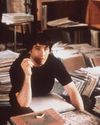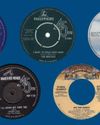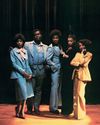
While it's hard to define exactly what Britpop was, or when it started and ended, you can't deny the 90s was a thrilling time for British music.
It was certainly a successful time for the guitar bands most closely associated with the term. But it was also a period when all kinds of artists who might have otherwise been cult successes suddenly found themselves in the mainstream, swept along in the general excitement. There was a seeming rush of great singles and albums released every week, the boom time for £15 CDs enabling the music industry to take chances on new acts to sign with all those sales.
When Oasis headlined Knebworth in 1996, the support bill included The Prodigy, Manic Street Preachers, The Chemical Brothers and Dreadzone. Immediately below Pulp on the Pyramid Stage when they headlined Glastonbury in 1995 were Orbital, Jamiroquai and PJ Harvey. None are names typically associated with Britpop, yet all flourished in its wake.
When Select magazine published its era-defining cover of Suede's Brett Anderson wrapped in a Union Jack in April 1993, the first wave of Britpop was already established: The Auteurs, Saint Etienne, Pulp and Denim were namechecked below a headline declaring: "Yanks go home!" If such a provocative statement sounds a bit strong 31 years on, certainly there was a reaction fomenting against the earnestness of American grunge. This first wave of Britpop provided an arty antidote to Pearl Jam et al: certainly, Suede and co were more glam than the Fred Perry, Kangol and Ellesse-clad hordes of the genre's commercial peak, a more streamlined guitar-pop style minted by Oasis.
That Oasis were signed by Creation's Alan McGee after seeing them support Eighteen Wheeler at Glasgow King Tut's in May 1993 is testament to how Britpop signalled not just lucrative royalties but also a vibrant A&R scene, a small venue network thriving before social media algorithms had any impact on who to sign.
この記事は Record Collector の July 2024 版に掲載されています。
7 日間の Magzter GOLD 無料トライアルを開始して、何千もの厳選されたプレミアム ストーリー、9,000 以上の雑誌や新聞にアクセスしてください。
すでに購読者です ? サインイン
この記事は Record Collector の July 2024 版に掲載されています。
7 日間の Magzter GOLD 無料トライアルを開始して、何千もの厳選されたプレミアム ストーリー、9,000 以上の雑誌や新聞にアクセスしてください。
すでに購読者です? サインイン

Paperback Blighters - The books every record collector should read.
The books every record collector should read. Vinyl, you may have heard, has made a big comeback. In 2022, sales of vinyl albums surpassed compact discs (CDs) for the first time in more than three decades in terms of global revenue, racking up more than $1.2bn.

"Beware the Savage Lure/of 1984..." - David Bowie is one of the most venerated musicians ever. But even he had his bad periods.
David Bowie is one of the most venerated musicians ever. But even he had his bad periods. For many, 1984 remains the nadir of his Phil Collins” phase; an artistic/sartonial/tonsorial disaster area. But was it really that awful? Forty years on, Matt Phillips explores Bowie's so-called annus horribilis.

7" Heaven & Hell the Story of the 45 - The 45 turns 75 this year. Matthew Quinlan charts its history, recalling the RPM wars and two belligerent titans who went into battle over the speed of spinning sound
Someone needs to come and empty the bins behind the Lloyds Bank branch in Kingston-upon-Thames. It’s been raining and flattened cardboard slumps next to a flytipped air conditioning unit and a rusting clothes rack. There are two signs at head height on the red brick wall. One warns that you’ll be clamped if you park here; the other, a stainless-steel plaque, marks Nipper’s 100th birthday. Nipper, the dog at the heart of the HMV and RCA Victor logos, was a white terrier with chocolate brown ears, maybe a Jack Russell, Smooth Fox, or Bull Terrier, more likely a mix. This is his final resting place. He was buried under a mulberry tree but, you know, urban sprawl, progress, etc. The plaque was unveiled by the Chairman of HMV Stores on 15 August 1984, while Captain Sensible, Janice Long, and a Nipper doppelganger looked on. Round the corner, at HMV and Our Price, George Michael’s Careless Whisper was flying off the shelves, and every copy turned at 45 RPM.

STARS ON 45s
A BUNCH OF MUSICIANS - 45, COUNT 'EM! RHAPSODISE ABOUT THEIR FAVOURITE SINGLE

THE TORTURED SHOPPER'S DEPARTMENT
John Coleman celebrates the great art of vinyl collecting on the 45th Anniversary of Record Collector and finds out, in an exhausting series of anxietyinducing sprees, how much vinyl you can buy today, ina variety of outlets, with 45.

Young American
A serendipitous collaboration with David Bowie in 1974 kick-started Luther Vandross' recording career. But he still faced an uphill struggle to succeed as a solo artist. Charles Waring talks to some of the singer's most trusted collaborators about his early years and how he battled to be heard....

MOD ALMIGHTY
Steve Ellis began his career as a mod in flower-power clobber as frontman of chart-toppers Love Affair. Quitting in 1970, he worked with The Who's Roger Daltrey then gave up music to become a docker before a near-death experience. Interest in his work was rekindled after hooking up with long-time fan Paul Weller. Lois Wilson hears how his romance with music endures.

ANARCHISTS IN THE UK
EXACTLY 45 YEARS AGO, CRASS, THE ANARCHIST ACTIVIST COLLECTIVE, WERE FINISHING PIVOTAL SECOND ALBUM, STATIONS OF THE CRASS.

The boy with the thorn in his side
David Cassidy was arguably the biggest solo star of the immediate post-Beatles era, yet his fame as well as his boyish good looks and extracurricular excessesovershadow the excellence of his breathily intimate, musically accomplished records. Simon Goddard, RC contributor and author of an acclaimed series of books on David Bowie, hails the work of the tortured pop idol

"I COULD JUST THROW MUD AT THE WALL"
There's little sign of slowing down from the 19-year-old Pete Townshend. Currently on the go: multi-media project The Age Of Anxiety; a dance production of Quadrophenia; and Pete Townshend Live In Concert 1985-2001, a 14-disc boxset of his solo in-concert recordings. Not, he admits, that his every whim and fancy are worth deeper exploration. \"Some of them are good ideas, some of them are pretty dumb,\"